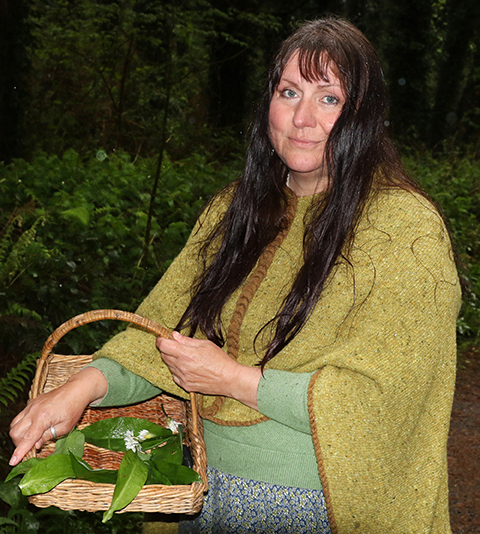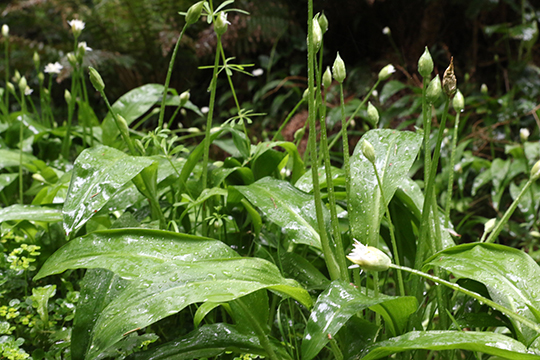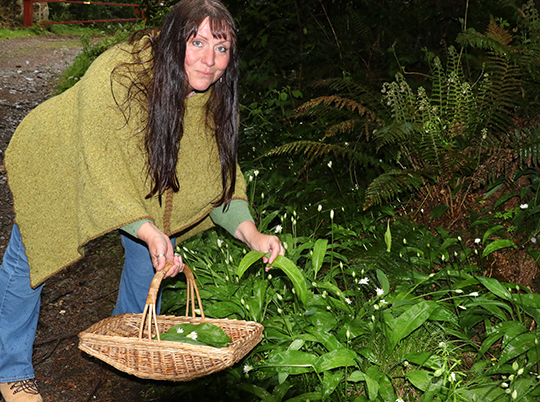A very weird Spring has sprung up here in County Down.
Helen Hastings interviews Alison McGrenaghan, expert forager, who lives near Downpatrick.
Our beaches are closed, the beer gardens shut, the bumper cars unbumped (not a word previously, but it is now!), our promenades eerily empty and the air thick with seagulls that would give their right wing for a cold chip!
It would seem that our world has been stripped bare of the little personal pleasures and freedoms that we take for granted. But more seriously, a collective neurosis has taken hold and we just feel an Agnst on a level that is alien to all of us.
The other day in a local shop (essentials only), I took part in the now familiar ‘dance’. A man appeared in the same aisle as me and shielded with our baked bean laden baskets we then commenced to walk backwards, then forwards, then backwards again, trying to figure out the best way to exit the aisle without touching.

It looked like a cross between a peacock mating ritual and Swan Lake. The man smiled apologetically, slumped his shoulders in defeat and then came out with this legend ‘It’s just hard to know what to do isn’t it?’ I laughed the ridiculously high pitched laugh I reserve for when things just get too weird and ducked out of the aisle moving fast.
When everything feels so strange and out of place with our daily social movements we can start to feel disconnected, not only from the world about us but from our own true selves. Nature seems to be our way out of the madness and with one session of daily exercise being the main outdoor activity of our day now, it’s a no brainer, but when nearly every jogger has their earphones plugged in, drowning out the birdcall, you start to wonder just how disconnected we are from the Earth we live on?
Each season brings a bounty of gifts laden with all it has to offer to pummel the human senses including our taste buds! I frequently take part in foraging, either on my own or with friends as a way of not only enjoying making and tasting delicious foods, but of deepening my connections with Mother Earth and finding a centred peace in this scary, mind-blowing world.

Alison McGrenaghan, a good friend of mine, and also an experienced forager, leads workshops on the subject, and I decided to ask her a few questions about one of our favourite foraging seasons… for Wild Garlic!
Helen: Wild garlic season is finally upon us! I know that like me, it’s one of your favourite seasons. There’s something very magical about the smell of wild garlic wafting through the trees in springtime. Would you say that it gives you a sense of renewal knowing that spring is on the way?
Alison: Yes, I guess I would. To be honest, speaking as a forager, birch sap is usually my first wild harvest of the year, but after that it’s 100% wild garlic that kicks my ‘wild food’ year off, and it’s a lot easier to harvest than birch sap. So yes, once the wild garlic is up Spring has definitely sprung. It’s symptomatic of that lovely fresh, swooshing energy that comes in between the equinoxes and the solstices, in this case between the spring equinox and summer solstice, when everything feels full of energy and purpose.
Helen: I always think it’s quite sad, the amount of people who have turned to processed food over the years, there’s people out there who don’t know what it is to cook from scratch let alone forage for wild food. Why do you think this has happened? What has changed in our society?
Alison: Processed and fast foods have their place, but in general, I would agree with you. I think there are many reasons for this, life moves at an overwhelmingly fast pace these day, excluding lockdown of course, and that can make it very challenging for people to find the time, energy and creative head space to cook from fresh.

Also not everyone is taught at home how to engage with food and cookery, it then becomes a trans-generational thing. I think some people think it will be too exacting from a technical perspective, but it really isn’t black magic.. it’s just a case of a little trial and error and building up your confidence. Once upon a time these skills were second nature to us, and we need to reclaim them, stand in our personal power and remember that we know this stuff. It is born in us to know how to gather food and cook.
Helen: We both know how versatile wild garlic is as an ingredient but can you tell me your personal favourites?
Alison: Oooh, where to begin! Well, obviously wild garlic pesto is a culinary star. There is so much you can do with it, if you manage to stop scooping it from the jar long enough to save some for cooking.
I love it on top of homemade sourdough pizza, or inside freshly caught trout as a stuffing, along with some butter and bread crumbs. Wild garlic soup is also delicious, as are bread and savoury scones with some minced wild garlic leaves mixed into the dough before baking. The flowers are lovely sprinkled over salad and can be enjoyed by those who prefer a milder garlic experience.
Helen: What are the health benefits of wild garlic?
Alison: Wild garlic is a real gem of natural health. Hypocrites said ‘let food be thy medicine and medicine thy food.’ And with this in mind I always feel that Mother Nature provides us with exactly the wild foods that we need at any given season of the year.
In the Autumn, when we are about to head into cough and cold season, she fills the hedgerows with berries rich in vitamin C and one of my personal favourites, elderberry, which impacts all forms of flu and corona virus. In the Spring, after we have come through a long Winter and our systems need a thorough cleanse, she provides us with nettle, cleaver and wild garlic.
Traditionally, wild garlic was a cure for intestinal worms, but assuming this isn’t a requirement high on the average person’s health requirements list these days, there are many other benefits, including properties that are anti-bacterial, anti-biotic and possibly anti-viral. It contains vitamins A and C, calcium, iron, phosphorus, sodium and copper. Studies have also shown that it is more effective than commercially grown bulb garlic in reducing blood pressure, thereby reducing the risk of stroke and heart disease.
Helen: I think that a lot of people have become force fed with so much modernity in recent years. Everything has become so easy but there seems to be too much technology and too much factory production in everything we do. Do you think that foraging is a way in which people can reconnect with the Earth and get ‘back to basics’? It would explain why it has become more popular in recent years ?
Alison: I think this question is more complex than it might initially seem. I’m a big advocate of reconnecting with Mother Earth, but in an informed and intelligent way. Our planet is in big difficulties at the moment and we cannot deny our own, negative influence here. I think we have become out of balance on so many levels and for a long time, ‘modernity’ as you phrase it, has certainly been reflected back to us in exaggeratedly glowing terms by some sectors of the media.
In a way I suppose we have become like Icarus, so enchanted by our own abilities, that we have begun to believe we are invincible and we all know how that ended…. it was and is a grave mistake. We need to remember that we belong to Mother Earth and not the other way around. We need to work with the seasons and remember, need, not greed. So re-engaging with activities such as growing and foraging for our own food is a great way to further this process.
It’s about taking responsibility, choosing to have the knowledge, rather than assuming that someone, somewhere will just do it for us. However, we need to reconnect in a sensitive manner.
I would be terrible to see foraging take off at such an extent that hedgerows became depleted and wildlife suffered.
With regard to the growing popularity of foraging, I think it is due to a number of reasons. It is a minority of us who now have the privilege of living in the countryside, so for many people, foraging affords them the chance to get out of town into a green space. There are some people who are becoming more interested in cooking than they were a few years back and I think some of the high profile TV shows have helped with this. When all is said and done, foraging gives you a fabulous day in the countryside, fresh air, exercise, the companionship of friends and family and a good, fresh, nutritious meal at the end of it, which didn’t cost you anything – what’s not to like?
Helen: Are there any spiritual associations with wild garlic? Is it still used in any magical or ritualistic practices ?
Alison: Like any native plant, but especially one with so many strong culinary and healing properties, there is plenty of magical tradition surrounding wild garlic. In astrology, wild garlic was ruled by Mars and Neptune. So as you might expect it is linked with things such as exorcism, passion, protection, spell-breaking, strength and clairvoyance.
In magic and ritual, wild garlic was thought to scare away venomous creatures. This belief, albeit in filtered form, comes down to us in modern times in the belief that it banishes vampires. It has also been used in other strong and vigorous magical practices including commanding confidence, consecration, courage, divination, healing, longevity, money, overcoming opposition, preventing nightmares, purification, stopping gossip and success.
Helen: What are the first steps in being a forager ?
Alison: Start simple. If you haven’t foraged before, or for a long while, start with something that you can’t mistake for anything else and that you can find safely and easily. I know it sounds like a bit of cop out, but go blackberrying. It might sound a bit mundane, but remember how much fun you had doing it as a child. Blackberries are delicious and nutritious and they will give you a safe and successful first trip.
If you enjoy this, then think about finding a foraging group or tutor that will take you out somewhere off the beaten track, to harvest something a little more adventurous. Once you have had a go with a tutor ‘riding tandem’ so as to speak, you will have the confidence to do it yourself in the future and they will serve as a backup person to check in with if you are not 100% sure about what you have gathered the next time you are out.
Basic rules are – always ask the landowners permission, personally I like to ask the plants permission too, but that’s up to you! Never take more than 10% of any one plant, as you have to remember the need of wild creatures, the sustainability of the plant and in the case of flowers, if you pick them all, there will be no berries in the Autumn.
Wear suitable clothing and footwear. Bring sun cream and insect repellent. Don’t pick beside the road, in areas where pesticides are being used or where dogs regularly go to the toilet.
Helen: There are of course dangers with everything in life, including foraging. Can you think of any serious dos and don’ts?
Alison: My number one rule is – don’t pick funguses unless you are with an expert. I won’t teach fungus foraging, as I think it’s too high risk. In fact there are only a few funguses I will use myself. Also beware of wasp and bee nests, some of them are ground dwelling and you can get very badly hurt if you disturb them.
If you are planning on using the plants raw, then wash them thoroughly as foxes and other animals might have urinated on them. Finally when in doubt DON’T – there are plants out there that will stop your heart dead, so please only take things that you are really, really sure of.
Helen: Do you have any amusing foraging incidents you’d like to share with us ?
Alison: Hmmm, well, without mentioning any names, I once made wild damson wine and it left someone talking in tongues until well into the following day, but for the sake of my own personal well-being, I think that might be enough said about that!!
Helen: We are living in a very scary and uncertain time right now, how do you think foraging serves us? How important do you think it is right now to rediscover our relationship and connection with Mother Earth?
Alison: I can think of little that is of more importance. With luck it will inform us and help us to understand the gentle rhythms of life and the planet. It will remind us that there are cyclical seasons and climatic regions and that everything isn’t just ‘on tap’ any time any place, anywhere.
I would hope it might reflect to us the need to take responsibility for our food and our health. Perhaps it will remind us to be gentle again and to flow with nature’s energy. Life is, was and always will be uncertain. We might have bought into the illusion that we were all powerful, but to be honest I don’t think it was a look that we wore very well. We need to change, I just hope that the changes we make will be for the better. We can live in hopes.
Like you can’t imagine. I am such a foodie. Kitchen counters of food excite me like nothing else, but when the food is made from the bounty of mother nature’s wild harvest, it definitely adds a whole extra layer of satisfaction.
Helen: Do you get a sense of real satisfaction when you look at a kitchen counter full of delicious foods made from your foraging?
Alison: Like you can’t imagine. I am such a foodie. Kitchen counters of food excite me like nothing else, but when the food is made from the bounty of mother nature’s wild harvest, it definitely adds a whole extra layer of satisfaction.
Helen: You are one of the most experienced foragers I know and I always remark on how naturally it comes to you. Why do you think you found foraging such a spiritual calling particularly?
Alison: Ha ha! Well I was once described as having ‘an eye in my head like a travelling rat.’ Perhaps that has given me a leading edge!! Seriously, I come from a long line of country folk. I think when you are connected through an ancestral line to something, it amplifies everything.
I also like to see the divine life source in everything. When all is said and done we live in a universe that perpetually consumes itself to reinvent itself. We do the same with nature’s plants and in time, she will do the same to us. To understand it, you have to step into the universal stream of life and become part of it. Let it flow through you and become part of you, you will be amazed by the things you start to see.
























